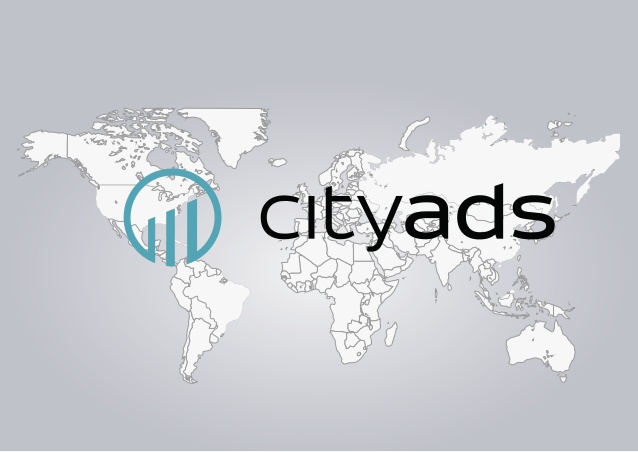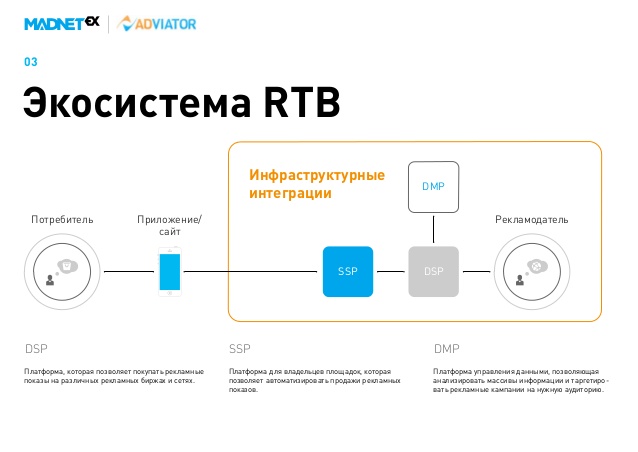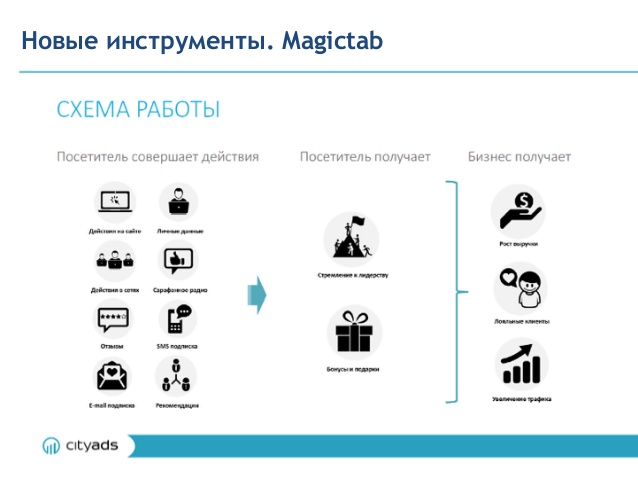Mikhail Balakin, CityAds: “We have always been a more technological company than a purely advertising one”

CityAds works in the advertising market, but it cannot be called an advertising company in its pure form. Market trends are such that without developed technologies, a company cannot cooperate productively with advertisers.
CityAds CEO Mikhail Balakin believes that in the modern world, it’s not those who have better secretaries, account managers and creative concepts, but those who have programmers who are more beardy than others. Mikhail talked to us and talked about how performance-marketing works, what are its prospects, about how the company managed to attract large and well-known customers - Booking, AliExpress, Microsoft, eBay.
')
In addition, we’ve found out if he considers CityAds to be Google’s competitor.
I have a general understanding of what your company does, but could you tell us in more detail?
We generate additional sales for customers. This may be online shopping, financial institutions interested in obtaining leads from borrowers and investors. These can be computer games where users pay or buy something. This may be mobile applications.
We are a player in the field of performance marketing. Everything we do is somehow tied to a specific result: selling, downloading an application, making a purchase inside an online game, filling out an application for a loan.
Now we have six operating offices - in Russia, China, Malaysia (serves Southeast Asia), Brazil (serves Latin America), Poland (serves Eastern and Central Europe). And there is a group of international development, which is located in Russia. She works with all clients who are where we have no offices.

If we talk about large and well-known customers, it is Booking, AliExpress, Microsoft, eBay, and a sufficient number of large e-commerce players.
You mention the names of large global companies. I am somewhat surprised that they chose a Russian company as a supplier of business-important services. What is the competitive advantage? Why did they stop on your services and are their consumers for quite a long period of time?
The beauty of performance marketing is that you sell the result. If you do not bring a result, you do not get paid. Therefore, it is somewhat easier for us to go to the client. Of course, in any mature market there is some distrust of new players, but we have been around for a long time: in Russia everyone knows us, in Brazil we are among the three largest partner networks. So with this fear you can work.
When you come to a major international player who does not work in Brazil or Russia, but sits somewhere in London, the existing client portfolio helps to convince them. We show cases with existing customers, we show how much additional sales we generate for them. This causes a keen interest of advertisers.
Let's roll back a bit. Same not any one system, and the tooling which is carrying out some functions? Is remarketing a key part of this system?
Not. Remarketing is one of the tools we provide to advertisers. In fact, the basis of everything is the so-called tracker - a software platform that allows the advertiser to track the sales that our publishers have provided.
By and large, we are a kind of intermediate link between an advertiser who is interested in new customers coming to him and publishers who may have some thematic traffic. For example, sites with coupons, discounts, sites with product reviews, and so on.
We provide an advertiser with a tool for interacting with a large number of publishers. Now we have about 130 thousand publishers registered in our system.
I will not hurt anyone if I compare you with the RTB platform?
The RTB platform is also only one part of the toolkit we offer. We are a performance-marketing platform. We work with different types of traffic. There is affiliate traffic, which the publisher is ready to “pour” on the offer of a particular advertiser. For example, travel sites. This is one type of traffic.

The second type is paid traffic: contextual advertising, placement on CPM, CPC on thematic platforms, where we manage the procurement ourselves, doing the so-called traffic arbitration. Part of the paid traffic is purchased through RTB.
Last year we bought the programmatic platform MADNET, which is quite strong in mobile. With the help of this platform, we can bring consumers additional sales and installations of mobile applications through our own programmatic procurement.
Why is it interesting to the advertiser? At the start of work there is always a period of buildup, when we connect a new advertiser and publishers are just looking at it, trying to understand how their traffic is converted to the advertiser’s offer. Therefore, the advertiser may not see the effect immediately. And due to our own programmatic platform tools we can give the advertiser a significant amount of sales and make our cooperation interesting from the very beginning.
I understand why this is beneficial to the advertiser. There is an increase in ROI. And what benefits are there for owners of thematic sites? What is the first priority? Maximizing traffic revenue or reducing the cost of managing many different platforms?
First of all, publishers are interested in two things: how much they earn and how quickly they get money. One of our main advantages over other platforms is that we can pay them faster. The advertiser, for example, confirms sales at the end of the month, but pays out the money within 30-60 days after the end of the month. We can pay the publisher immediately after we receive confirmation from the advertiser. No need to wait 30-60 days until we physically receive money from the advertiser. Of course, the speed of receiving money depends on the status of the publisher: the privileged get it faster, and the long tail - on slightly worse conditions. But in any case, we help them get money faster than with the direct work of publishers with advertisers.
In principle, many large advertisers are ready to work with publishers and directly, for example, the same Amazon or eBay, but we can pay for the publisher for the same affiliate program faster. This is a defining moment for them.
The second point is related to how much they earn. The technological platform, the tracker itself, plays a role here. If he works fast enough, he sees more sales than on third-party solutions. Well, plus the service that we provide to publishers: we advise, what else offer to try, where the traffic that they have can bring a good result. This is something that big e-commerce will never do in its life, because it is big: it is difficult for it to manage thousands of publishers. And we specialize in this.
Your company has been around for a long time - since 2010. Over the past 6 years you have taken a good place in the market of performance-marketing. What's next? Now you are already making some platform investments related to related functions in the advertising market. Will you make more purchases to increase your market share? At what point can Google become your competitor, not a tool supplier?
Indeed, in five years we have grown quite strongly. Initially it was a small company that specialized solely on the gaming vertical. Then came the financial vertical. Because of the large Russian affiliate programs, we were the last to enter e-commerce niche, which is a major market driver.
If you now look to the future, we understand that the advertiser's interest is shifting towards more integrated solutions. They are increasingly looking at the quality of traffic, so in its pure form, the model of mediation between the advertiser and publisher has a certain ceiling.

Next, we see ourselves as a provider of shared performance solutions. All our investments and purchases were dictated by this. We bought projects such as MADNET, Magictab, in order to provide advertisers with comprehensive performance solutions in the markets in which we operate.

If we talk about the prospects of the next 3-5 years, we see that most of the traffic will shift in mobile. In my opinion, already now parity in e-commerce and finance is reached - 50% mobile, 50% desktop. We will invest more in solutions related to mobile, and there is not so much affiliate traffic as on the desktop.
Will we compete with Google? I think that he still remains the largest source of traffic. We do not compete with him, but supplement and sometimes fill the void that has formed. For example, companies that issue short-term loans (so-called payday loans) cannot be advertised in Google (it is forbidden to them), so they go to affiliate. So, here we will replace Google.
In other industries in different ways, but I think it will be a long story of love and hate: somewhere we will compete, somewhere we will help and cooperate. In any case, the backbone of Google’s business is still a search, and we have no intention of becoming a search engine.
For a long time, the advertising industry was not technically loaded. There have always been more of those people who know how to sell well and present the product. Now this situation has changed. Do you have such changes in your company? How interested is the company in developing its own software products?
The first wave of interest in advertising technology began in 2009. Now this story is experiencing a rebirth. For example, The Trading Desk recently very successfully went to the IPO. This gave rise to a second wave of investor interest in advertising technologies. Indeed, in the modern world, win is not those who have better secretaries, account managers and creative concepts, but those who have “beard” programmers. Yes, technology plays an increasing role.
Moreover, I think they will play a key role - especially in the performance-marketing segment. In order to bring an advertiser the result, you need to be able to buy traffic more efficiently than all the others, to make hundreds of decisions in a very short period of time. Without machine learning, this is impossible.
We have always been a more technological company than a purely advertising one. We have always had more R & D staff than competing companies. We have always invested a lot in developing and creating new tools. Sometimes it was successful, sometimes not. But that is another question. I think the focus on technology will remain.
Even if we talk about affiliate marketing in general, there is a greater interest of advertisers in technology solutions, rather than direct assistance in attracting traffic. If you look at the developed market of Western Europe, most large advertisers try to manage all their affiliate programs on their own and use third-party technological solutions to organize interaction with a large number of publishers. So the role of IT in this segment will continue to grow.
Of course, the advertising business has its own specifics. Here, you still need to sell. Here is the latest example of the company Applovin, where there were 20% of commercial specialists and 70% of R & D. The company has achieved amazing financial results due to its technology and ability to buy advertising better than others, and has grown to a turnover of hundreds of millions of dollars literally on the "popular rumor." And eventually sold for $ 1.5 billion.

What about the ratio of R & D and all others in your company?
Now there are about 80 people in our R & D department, and there are about 200 people working in the company. Moreover, we used to have a higher ratio in favor of R & D. The balance of power has changed only with the start of regional expansion, since in the regions we hire only front-office staff in charge of business, not developers.
Source: https://habr.com/ru/post/313536/
All Articles